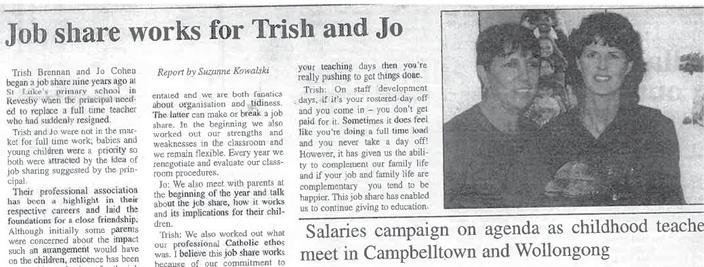
The IEU first reported on Patricia Brennan and Joann Coen’s job share in 1998. In 2020 they talk to IEU journalist Monica Crouch about how they did it for over two decades.










































































































































Thanks for sharing
2020 October Newsmonth


The IEU first reported on Patricia Brennan and Joann Coen’s job share in 1998. In 2020 they talk to IEU journalist Monica Crouch about how they did it for over two decades.

When primary school teachers Patricia (Trish) Brennan and Joann (Jo) Cohen met in 1989 at St Luke’s Catholic Primary School in Revesby, little did they know they were about to embark upon job sharing for the next 21 years – as well as a lifelong friendship.
While the IEU is hearing rumbles of some employers resisting such flexible arrangements, Jo (pictured above, in red) and Trish (in white) experienced the opposite. Initially, the school’s principal asked them to work as a team for just six weeks until a permanent, full-time teacher could be found.
They settled into this six-week arrangement well; both found it rewarding and relished the work-life balance. “At the end of the year, the principal approached us and told us he valued our enthusiasm and passion for teaching and offered us a job share position for the next year,” Jo and Trish said. They accepted without hesitation.
Throughout their 21 years together, Jo and Trish taught Years 2, 3, 4, 5 and 6. In 2011 Trish accepted a full-time role. “We joke about this as the year we got divorced!” the pair say. Here they tell us what it took to sustain such a long “marriage”.
Nuts and bolts
“Before we started our job share we met to discuss our teaching styles, our strengths and our beliefs in how children learn best,” Jo and Trish said. “We discovered we had a lot in common, both personally and professionally, as well as a balanced approach to learning that combines old and new ideas.”
Here’s how it worked: Jo and Trish taught the same class (Trish on Mon-Wed and Jo Thurs-Fri). They met regularly. They talked on the phone most days. “Our husbands nicknamed us ‘Have a Chat 1’ and ‘Have a Chat 2’,” they said. They also used a communication book to keep each other up to date.
Despite working on different days, “together” is a recurring theme. “We programmed together, we wrote reports together, we attended parent-teacher nights together,” they said. “We both attended all staff meetings and staff development days even if they did not fall on our working days.”
They kept the classroom neat and tidy for each other. “We always corrected the work we taught,” they said. “And we met during school holidays to prepare our classroom for the next term.”
They agreed on who would teach what. “Each of us taught religion, maths and English every day,” they said. “And each term we would negotiate who would teach the other subjects.” They negotiated and compromised around professional development and school excursions.
Meticulous record keeping was essential. “We annotated what was covered so that we knew exactly where we were up to and what still needed to be covered,” they said.
On the upside
Flexibility is the key theme here. “We loved being able to balance home and work life,” Jo and Trish say. “We made sure that if one of us was sick the other would take the class so the students would have continuity in their learning.”
Both enjoyed having each other to talk to about student progress and needs, whether these were academic or social. “We could always depend on each other for support,” they said. “And it helped us to keep up to date with current trends in education.”
Trish and Jo felt the benefit of coming in fresh after their days off – both for themselves and their students – and both still felt very much a part of the school community.
Jo and Trish speak very highly of each other. “We valued each other’s ideas, feedback, suggestions and opinions,” both said. “Our work ethic was the same. We are dedicated teachers and the students’ interests were of utmost importance to us.”
On the challenges
Sometimes, Jo and Trish say, it could be quite a juggling act to fit in regular discussions, correcting schoolwork, programming, preparing lessons and looking after their young families (Jo had three children and Trish four).
“We definitely did some extra work along the way,” they said. “But when you enjoy teaching and have a passion for your job, you accept that at times it is necessary to work longer hours to achieve your goals.”
Student response
Over the years, Jo and Trish noticed their students responded will to their different teaching styles and personalities – it taught them resilience and flexibility.
Again, they appreciated one other. “Two heads are better than one when you need to come up with strategies for behaviour management of a student,” they said. “And if you have a challenging student, it helps when you can have a break and come in fresh after your days off.”
They “presented a united front” to their students to avoid being played off against one another.
Tips for new players
Jo and Trish offer some sound advice for teachers who would like to embark on a job share: be clear on your expectations with classroom maintenance and book work; take equal responsibility for programming, lesson prep and corrections; keep meticulous records and communicate regularly. Above all, support each other.
“Before you job share, make sure you have a good understanding of how children learn best and how you can complement each other’s teaching styles,” they said.
There are, of course, the occasional pitfalls. Beware of one person doing all the work, they say. Respect each other’s different personalities. And be flexible about swapping days occasionally.